Oprah Returns to Williamson, West Virginia

In 1987, The Oprah Winfrey Show visited the small town of Williamson, West Virginia. The town had been thrust into the national spotlight when Mike Sisco, a local man with AIDS, jumped into a public swimming pool. While this would not be news in 2010, it was a lightning rod for anger and fear about AIDS and homosexuality in 1987.
Read how the town reacted to Mike when Oprah first visited Williamson.
Though Mike passed away in 1994, he changed his hometown forever. Twenty-three years after Oprah's first visit, some of the citizens who spoke out have returned to the Williamson Field House, where the original show was filmed, to reflect on whether their opinions have changed with time.
Read how the town reacted to Mike when Oprah first visited Williamson.
Though Mike passed away in 1994, he changed his hometown forever. Twenty-three years after Oprah's first visit, some of the citizens who spoke out have returned to the Williamson Field House, where the original show was filmed, to reflect on whether their opinions have changed with time.
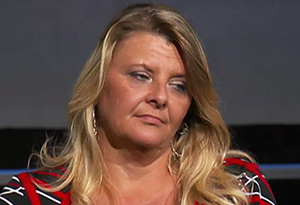
In 1987, Mike's sister Tina was so worried about how speaking out in support of her brother on television would affect her son that she went by the name "Liz" and wore a wig to hide her identity. Today, Tina is joined by Mike's other sisters, Anna and Lea, to discuss their late brother's life.
Watch Tina, Anna and Lea reflect on their brother's life.
Tina says Mike was always glad he spoke out in 1987, even though he put himself at significant risk. "He just wanted to educate people," she says. "It was never anything other than [to] get some education out there."
Watch Tina, Anna and Lea reflect on their brother's life.
Tina says Mike was always glad he spoke out in 1987, even though he put himself at significant risk. "He just wanted to educate people," she says. "It was never anything other than [to] get some education out there."
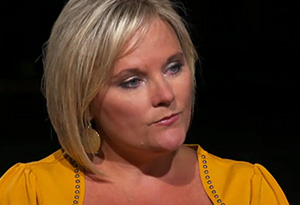
Tina says Mike moved away from Williamson after the show—first to Charleston, West Virginia, and then later to California.
Lea says Mike's death was a peaceful one. "I was there that night. Tina met me at the door. She said, 'He hasn't spoken all day today.' I walked in his room and he opened his arms up and he said, 'Where have you been?' I went over and hugged him," she says. "That night, I went and sat with him, we had a little bed fixed beside his bed. And while my husband and son slept in another bedroom and my dad slept, he passed away."
Lea says Mike's death was a peaceful one. "I was there that night. Tina met me at the door. She said, 'He hasn't spoken all day today.' I walked in his room and he opened his arms up and he said, 'Where have you been?' I went over and hugged him," she says. "That night, I went and sat with him, we had a little bed fixed beside his bed. And while my husband and son slept in another bedroom and my dad slept, he passed away."
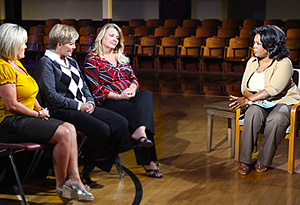
All three sisters say the trip to the pool that sparked the controversy was not intended as a political statement; it was just an escape from a stiflingly hot summer day. "It never even crossed my mind to not go," Tina says.
"We loved going to that swimming pool. Growing up, we lived about five houses away," Lea says. "We went to the pool every single day."
Once they arrived, however, they say they could tell the other town residents did not want them there. "That's why I said [to Mike], 'On the count of three you'd better get in because we won't get back in,'" Tina says.
"We loved going to that swimming pool. Growing up, we lived about five houses away," Lea says. "We went to the pool every single day."
Once they arrived, however, they say they could tell the other town residents did not want them there. "That's why I said [to Mike], 'On the count of three you'd better get in because we won't get back in,'" Tina says.
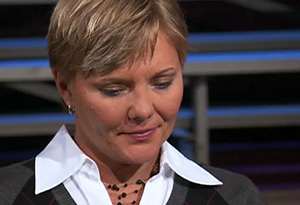
In 1987, Mike told Oprah that some extended family members had told him he could not be buried in the family plot because he had AIDS. Lea thinks Mike's homosexuality was the true reason behind their reluctance. "I'm sure that played a bigger role than what anybody would ever admit to," she says. Mike's mother's casket had to be moved to another cemetery, where Mike and his father were later buried.
Mike's sister Anna was a 17-year-old high school senior in 1987. She says she too knew she was gay at the time. Anna says Mike wanted his appearance on The Oprah Winfrey Show to be exclusively about exposing myths about how AIDS is spread. "It didn't," she says. "It turned to him being a homosexual. And I think some people got the purpose of the show, and some people totally missed it."
Anna says Williamson today is more welcoming to gay women than it was when she was growing up but that it's still a difficult place for gay men. "Unfortunately, I think people are still geographically uneducated about anyone other than this area," she says. "I hate to say it, but it's the way I feel."
Mike's sister Anna was a 17-year-old high school senior in 1987. She says she too knew she was gay at the time. Anna says Mike wanted his appearance on The Oprah Winfrey Show to be exclusively about exposing myths about how AIDS is spread. "It didn't," she says. "It turned to him being a homosexual. And I think some people got the purpose of the show, and some people totally missed it."
Anna says Williamson today is more welcoming to gay women than it was when she was growing up but that it's still a difficult place for gay men. "Unfortunately, I think people are still geographically uneducated about anyone other than this area," she says. "I hate to say it, but it's the way I feel."
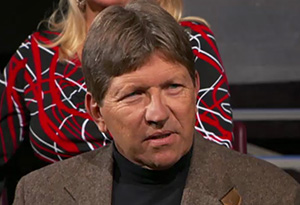
One of the most unforgettable people who spoke out in 1987 is Jerry Waters. At the time, Jerry was a firefighter in Charleston, West Virginia—a larger town located about 80 miles away. "I decided to go to Williamson," he says. "I felt that although the good folks in Williamson would be able to express their opinions, I felt I could express mine a little more forcefully."
At the first show, he said he was in favor of quarantining AIDS patients, was "repulsed" by both AIDS and homosexuals like Mike and fiercely objected to scientific information from public health officials about how AIDS is spread. After retiring from the fire department, Jerry began a career as a radio talk show host.
Jerry says looking back on his comments from 1987 is painful. "I am a passionate person. Anyone who knows me knows I am animated, but the reason I came to Williamson was not to bash gays. I felt that that's actually what I wound up doing. And that was not my purpose to be there," he says. "I was caught up in the mob mentality"
At the first show, he said he was in favor of quarantining AIDS patients, was "repulsed" by both AIDS and homosexuals like Mike and fiercely objected to scientific information from public health officials about how AIDS is spread. After retiring from the fire department, Jerry began a career as a radio talk show host.
Jerry says looking back on his comments from 1987 is painful. "I am a passionate person. Anyone who knows me knows I am animated, but the reason I came to Williamson was not to bash gays. I felt that that's actually what I wound up doing. And that was not my purpose to be there," he says. "I was caught up in the mob mentality"
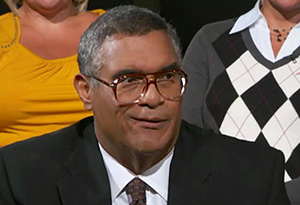
In one of the most explosive encounters in the 1987 show, Dr. Woodrow Myers, a public health official from Indiana, directly addressed Jerry. Dr. Myers said Jerry was fearful of AIDS because he didn't know the truth about it.
Jerry says this heated exchanged provoked him to say he was repulsed by gays. "It wasn't about the gay; it wasn't about the disease. It was about the doctor telling me, 'Sir, you're afraid.'"
Watch this unforgettable moment from 1987.
Jerry also says he was upset because he believed the government was misleading citizens about how AIDS was transmitted. Dr. Myers says Jerry was wrong about this then and is still wrong today if he thinks the same things. "Public health officials who have no reason to lie didn't lie then, aren't lying today," he says. "We tell the public what we know; we tell the public the intensity with which we know it."
Dr. Myers says there's been progress in HIV/AIDS education. "We still have a lot of myths. We still have a lot of rumors around the world about how you get it, how you don't get it," he says. "But it's much better today than it's ever been."
Learn about the state of HIV/AIDS today.
Jerry says this heated exchanged provoked him to say he was repulsed by gays. "It wasn't about the gay; it wasn't about the disease. It was about the doctor telling me, 'Sir, you're afraid.'"
Watch this unforgettable moment from 1987.
Jerry also says he was upset because he believed the government was misleading citizens about how AIDS was transmitted. Dr. Myers says Jerry was wrong about this then and is still wrong today if he thinks the same things. "Public health officials who have no reason to lie didn't lie then, aren't lying today," he says. "We tell the public what we know; we tell the public the intensity with which we know it."
Dr. Myers says there's been progress in HIV/AIDS education. "We still have a lot of myths. We still have a lot of rumors around the world about how you get it, how you don't get it," he says. "But it's much better today than it's ever been."
Learn about the state of HIV/AIDS today.
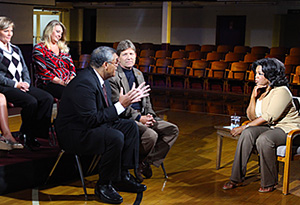
Jerry says he believes Mike was trying to use Williamson to make a statement. He says he's sorry for the Sisco family's loss, but he's also sorry for the people of Williamson. "I think it could have been avoided by [Mike] staying in a community where you would have, I would think, much more support—in a larger city—than bringing it to a tiny town where you'd have basically no support and scare people," he says.
Watch what Oprah and the Sisco family think about what Jerry says.
Anna responds to Jerry, saying her brother came home precisely for help. "Should he have stayed in Dallas, away from his family? We are his support," she says. "With all due respect, Jerry, there are gay people everywhere. We are everywhere."
Watch what Oprah and the Sisco family think about what Jerry says.
Anna responds to Jerry, saying her brother came home precisely for help. "Should he have stayed in Dallas, away from his family? We are his support," she says. "With all due respect, Jerry, there are gay people everywhere. We are everywhere."
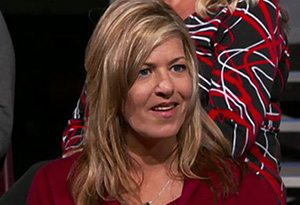
Cynthia was a high school classmate of Anna's who attended the 1987 show but didn't say anything that day. She says hearing what the people of Williamson really thought about AIDS and homosexuality shocked her. "I expected better representation out of adults in the room. I had never really experienced anything like that," she says. "I think AIDS drew the fear, but him being gay drew the hatred."
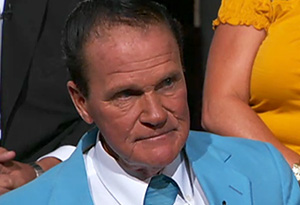
In 1987, Bob Webb was a 51-year-old railroad engineer. He says he went to the taping of The Oprah Winfrey Show to "stand up for the word of God." At that time, he says, he didn't even know what AIDS was. "I don't have anything against him; I just don't want to be around him," he said at the time.
Today, Bob says while he still believes homosexuality is "an abomination," he is embarrassed by his old remarks and has changed his perspective. "I can't believe I even made that statement," he says. "I'm a Christian, and that wasn't the right thing to say. God says love everybody, and that's what I do. I apologize to these girls for that statement. The number one rule of God is love everybody."
Today, Bob says while he still believes homosexuality is "an abomination," he is embarrassed by his old remarks and has changed his perspective. "I can't believe I even made that statement," he says. "I'm a Christian, and that wasn't the right thing to say. God says love everybody, and that's what I do. I apologize to these girls for that statement. The number one rule of God is love everybody."
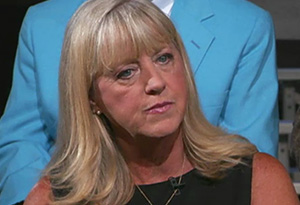
In 1987, Nina Blackburn was a stay-at-home mom who was scared that someone with AIDS in a pool could put her children in danger. Today, she apologizes if anything she said hurt Mike and his family. "If he was here, I'd give him a big hug because I know he had to be really, really scared. I'm glad you were there with him," she says.
Nina says she wished her community had shown more compassion 23 years ago. "Trying to put yourself in their place and understand what they were going through—not just him, but the family as well," she says. "We all have some kind of tragedy."
Nina says she wished her community had shown more compassion 23 years ago. "Trying to put yourself in their place and understand what they were going through—not just him, but the family as well," she says. "We all have some kind of tragedy."
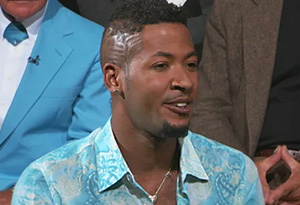
While Eugene says he's known he was gay since he was 6 years old, he didn't come out until he left Williamson. "You can be gay here in West Virginia, but it's more [of an on the down low] kind of thing. There's a lot of that here," he says. "I just had to go."
Eugene says Mike's public fight made it easier for him to come out and accept his true self. "[He's] a hero. It takes a lot of guts to get on The Oprah Winfrey Show and say you're gay in 1987," he says. "I'm an HIV positive guy. ... My family supports me; they love me. Nobody frowns on me; my friends know. And now the town will know."
Watch how Mike's story inspired another viewer.
As a reminder, always consult your doctor for medical advice and treatment before starting any program.



